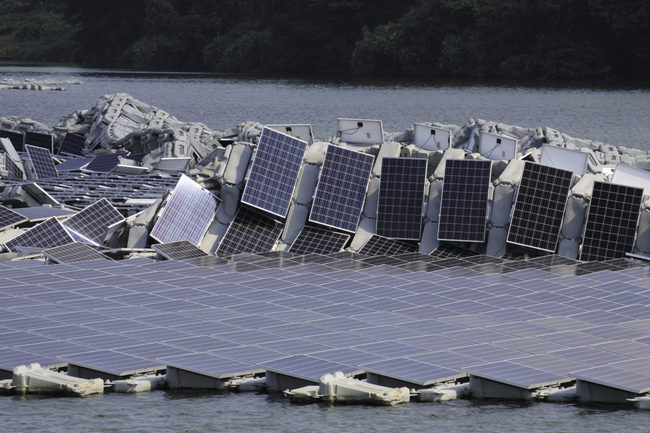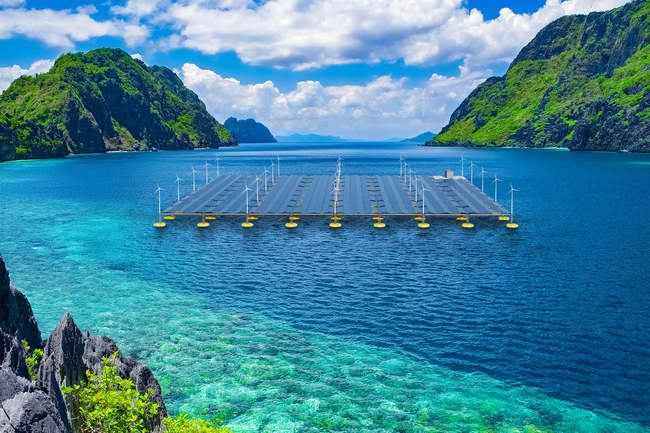According to IRENA, floating solar is an emerging market with a high potential for rapid growth. While freshwater floating PV is being installed in more than 40 countries worldwide, seawater floating PV is a new market. In contrast to freshwater floating PV, providers of seawater floating PV are confronted with harsh environments, where the widely known conventional systems will fail. SINN Power’s Ocean Hybrid Platform is a seaworthy solution suitable for nearshore and offshore applications and ready for reliable and economical operations.

Floating PV (FPV) encompasses two markets, namely the freshwater FPV and the seawater FPV, as defined in the current Offshore Renewables Action Agenda 2021 by IRENA. According to a study by NREL the energy potential of floating PV on hydropower reservoirs is estimated to 7.6 TW (NREL, 2020). Currently, local potentials of seawater floating PV are investigated, e.g., for the Netherlands 45 GW. The worldwide potential of seawater floating PV is, according to IRENA, not estimated yet. However, current studies and market growth numbers show that seawater FPV has great potential to contribute to the blue economy.
The freshwater solutions are normally designed for deployment on calm waters like lakes or reservoirs. They can also be built in harbours or protected bays if the chosen material is salt water-resistant. Nevertheless, these systems are not safe against de facto any maritime location, not even in the Adriatic Sea, the Arabian Sea, or an enormous lake, due to the regular extreme events with high waves and/or wind. As the possibility of extreme weather events rises, these systems are in danger of failing (Picture 4). Depending on the extent of damage, consequences will range from loss of revenue up to a complete loss of investment. Therefore, current freshwater solutions face restrictions in deployments at sea, partly even in protected coastal areas and big lakes.
On the other hand, flexible and uprising stiff seawater FPV systems are being developed and tested in protected areas. As an exception, SINN Power’s solution, the Ocean Hybrid Platform, is designed for unprotected maritime environments with a significant wave height of 12 m and wind speeds of 27 m/s without taking any damage (limited by the PV-cells). The floating structure itself survives wind speeds of up to 60 m/s. In addition, the OHP is designed maintenance free, a crucial factor in the financial performance of RE systems, and deployable in areas where current solutions are unsuitable. That opens completely new areas of applications for the RE market, including small, medium, and large-scale deployments in nearshore and offshore environments.

Dr. Ing. Philipp SINN (CEO, SINN Power): „Our approach to design a durable and long-living platform for renewable energy production in the maritime environment will drastically change the RE ecosystem. Potential use cases for project developers include the complementation of offshore wind parks to increase baseload capacity, providing RE to aquacultures, the hydrogen production, or simply producing electricity for coastal areas, remote islands, and many more.”
SINN Power has successfully carried out real-life tests in Heraklion and actively markets its innovative solution to project developers worldwide. In addition to the necessary hardware, including IP68-protected, smart-grid forming power electronics for floating hybrid systems, SINN Power offers a wide range of engineering, procurement, and installation services, including operation and maintenance following the requirements of the respective customers.
Learn more about SINN Power’s products and services www.sinnpower.com
SINN Power GmbH
In 2014, Dr. Philipp Sinn founded the company SINN Power based on intense years of academic research. The vision was and still is today to create the most efficient renewable energy technology of the 21st century by leveraging the potential of ocean-based energy production.
Today, SINN Power develops and distributes sustainable power generation technologies designed for harsh and maritime environments. Using the scalable versatile floating platform (OHP) and power electronics, SINN Power provides the ideal components for self-developed wave power plants. In addition, these components enable the seamless incorporation of other sustainable generation technologies such as photovoltaics and small wind turbines into the SINN Power system.
